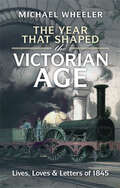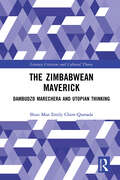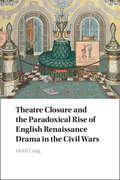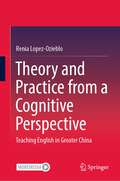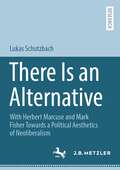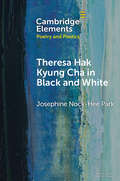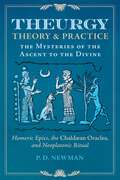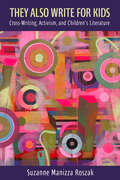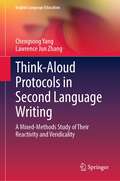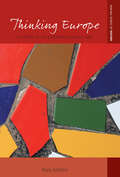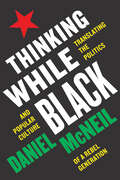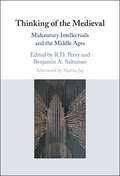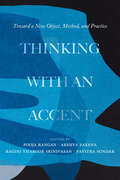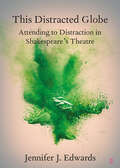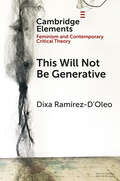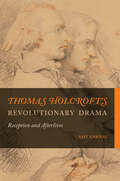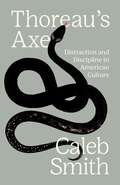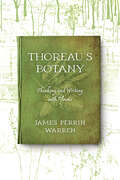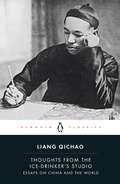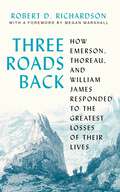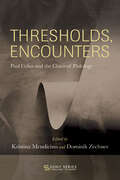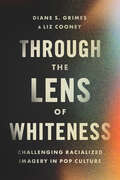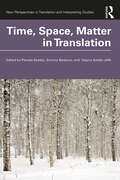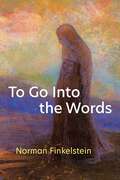- Table View
- List View
The Year That Shaped the Victorian Age: Lives, Loves and Letters of 1845
by Michael WheelerWhat was special about 1845 and why does it deserve particular scrutiny? In his much-anticipated new book, one of the leading authorities on the Victorian age argues that this was the critical year in a decade which witnessed revolution on continental Europe, the threat of mass insurrection at home and radical developments in railway transport, communications, religion, literature and the arts. The effects of the new poor law now became visible in the workhouses; a potato blight started in Ireland, heralding the Great Famine; and the Church of England was rocked to its foundations by John Henry Newman's conversion to Roman Catholicism. What Victorian England became was moulded, says Michael Wheeler, in the crucible of 1845. Exploring pivotal correspondence, together with pamphlets, articles and cartoons, the author tells the riveting story of a seismic epoch through the lives, loves and letters of leading contemporaneous figures.
The Zimbabwean Maverick: Dambudzo Marechera and Utopian Thinking (Literary Criticism and Cultural Theory)
by Shun Man CHOW-QUESADAThis book seeks to unfold the complexity within the works of Dambudzo Marechera and presents scholars and readers with a way of reading his works in light of utopian thinking. Writing during a traumatic transitional period in Zimbabwe’s history, Marechera witnessed the upheavals caused by different parties battling for power in the nation. Aware of the fact that all institutionalized narratives – whether they originated from the colonial governance of the UK, Ian Smith’s white minority regime, or Zimbabwe’s revolutionary parties – appeal to visions of a utopian society but reveal themselves to be fiction, Marechera imagined a unique utopia. For Marechera, utopia is not a static entity but a moment of perpetual change. He rethinks utopia by phrasing it as an ongoing event that ceaselessly contests institutionalized narratives of the postcolonial self and its relationship to society. Marechera writes towards a vision of an alternative future for the country. Yet, it is a vision that does not constitute a fully rounded sense of utopia. Being cautious about the world and the operation of power upon the people, rather than imposing his own utopian ideals, Marechera chooses instead to destabilize the narrative constitution of the self in relation to society in order to turn towards a truly radical utopian thinking that empowers the individual.
Theatre Closure and the Paradoxical Rise of English Renaissance Drama in the Civil Wars
by Heidi CraigFocusing on the production and reception of drama during the theatre closures of 1642 to 1660, Heidi Craig shows how the 'death' of contemporary theatre in fact gave birth to English Renaissance drama as a critical field. While the prohibition on playing in many respects killed the English stage, drama thrived in print, with stationers publishing unprecedented numbers of previously unprinted professional plays, vaunting playbooks' ties to the receding theatrical past. Marketed in terms of novelty and nostalgia, plays unprinted before 1642 gained new life. Stationers also anatomized the whole corpus of English drama, printing the first anthologies and comprehensive catalogues of drama. Craig captures this crucial turning-point in English theatre history with chapters on royalist nostalgia, clandestine theatrical revivals, dramatic compendia, and the mysteriously small number of Shakespeare editions issued during the period, as well as a new incisive reading of Beaumont and Fletcher's A King and No King.
Theory and Practice from a Cognitive Perspective: Teaching English in Greater China
by Renia Lopez-OziebloThis book is intended as a theoretical and practical resource for both new and experienced teachers of a second language. It integrates some of the ideas from cognitive linguistics into existing classroom approaches for teaching English as a second language through a series of lesson plans developed by teachers of English from Mainland China and Hong Kong. The lesson plans provide step-by-step instructions for teachers, including resources and an explanation of the theories underpinning each step. These plans, many of which are integrated into specific English as a foreign language textbook units, encourage teachers to be creative by adding or adapting the material they have in order to engage their students. Although the main audience is English teachers, the theoretical principles covered are applicable to teachers of any foreign language and the practical examples, provided in the lesson plans, can be easily modified to teach other languages as well. Similarly, it is not just for teachers working in Chinese contexts but for anyone interested in embodied cognition as a teaching approach. I intend these pages to serve as a companion for teachers to reflect on their existing practices, to provide new ideas and to make them aware of the many factors affecting learning.
There Is an Alternative: With Herbert Marcuse and Mark Fisher Towards a Political Aesthetics of Neoliberalism
by Lukas SchutzbachThe book aims at interrogating the contemporary problematic of neoliberalism and its relationship to culture and ideology through the lens of a theoretical synthesis interweaving the emancipatory aesthetics of Herbert Marcuse, Fredric Jameson's pathbreaking analysis of the cultural logic of late capitalism, and the late Mark Fisher's work on "post-capitalist desire" and "acid communism." The main imperative is to formulate a possible (and, as it turns out, necessary) opening for aesthetic critique in the climate of contemporary neoliberal capitalism. This mode of aesthetic critique is then operationalized through an exemplary reading of the emancipatory poetics of Ben Lerner's 2014 novel "10:04."
Theresa Hak Kyung Cha in Black and White (Elements in Poetry and Poetics)
by Josephine Nock-HeeTheresa Hak Kyung Cha in Black and White explores the relation between text, author, and reader – a nexus theorized as the 'apparatus' in Cha's study of cinema – by tracing two key literary intertexts in Dictée: Henry James's 'The Jolly Corner,' a submerged literary resonance in Apparatus, Cha's anthology of film theory, and the writing of Saint Thérèse of Lisieux, a primary intertext at the heart of Dictée. In Cha's film theory, black and white is the flicker of the cinematic apparatus, and the Elements readings consider this contrasting palette in self-reflexive portraits in black and white. This study reads flashes of identification, often in punishing self-encounters, and it dwells on the figure of the martyr to arrive at the death of Theresa Hak Kyung Cha, the patron saint of artists and scholars fascinated by her art and her suffering.
Theurgy: The Mysteries of the Ascent to the Divine
by P. D. NewmanConnects the magical practice of theurgy to the time of Homer• Explores the many theurgic themes and events in the Odyssey and the Iliad• Analyzes the writings of Neoplatonists Porphyry and Proclus, showing how both describe the technical ritual praxis of theurgy in Homeric terms• Examines the methods of telestikē, a form of theurgic statue animation and technique to divinize the soul, and how theurgy is akin to shamanic soul flightFirst defined by the second century Chaldean Oracles, theurgy is an ancient magic practice whereby practitioners divinized the soul and achieved mystical union with a deity, the Demiurge, or the One.In this detailed study, P. D. Newman pushes the roots of theurgy all the way back before the time of Homer. He shows how the Chaldean Oracles were not only written in Homeric Greek but also in dactylic hexameter, the same meter as the epics of Homer. Linking the Greek shamanic practices of the late Archaic period with the theurgic rites of late antiquity, the author explains how both anabasis, soul ascent, and katabasis, soul descent, can be considered varieties of shamanic soul flight and how these practices existed in ancient Greek culture prior to the influx of shamanic influence from Thrace and the Hyperborean North.The author explores the many theurgic themes and symbolic events in the Odyssey and the Iliad, including the famous journey of Odysseus to Hades and the incident of the funeral pyre of Patroclus. He presents a close analysis of On the Cave of the Nymphs, Porphyry&’s commentary on Homer&’s Odyssey, as well as a detailed look at Proclus&’s symbolic reading of Homer&’s Iliad, showing how both of these Neoplatonists describe the philosophical theory and the technical ritual praxis of theurgy. Using the Chaldean Oracles as a case study, Newman examines in detail the methods of telestikē, a form of theurgic statue animation, linking this practice to ancient Egyptian and Greek traditions as well as theurgic techniques to divinize the soul.Revealing how the theurgic arts are far older than the second century, Newman&’s study not only examines the philosophical theory of theurgy but also the actual ritual practices of the theurgists, as described in their own words.
They Also Write for Kids: Cross-Writing, Activism, and Children's Literature (Cultures of Childhood)
by Suzanne Manizza RoszakOutside the world of children’s literature studies, children’s books by authors of well-known texts “for adults” are often forgotten or marginalized. Although many adults today read contemporary children’s and young adult fiction for pleasure, others continue to see such texts as unsuitable for older audiences, and they are unlikely to cross-read children’s books that were themselves cross-written by authors like Chinua Achebe, Anita Desai, Joy Harjo, or Amy Tan. Meanwhile, these literary voices have produced politically vital works of children’s literature whose complex themes persist across boundaries of expected audience. These works form part of a larger body of activist writing “for children” that has long challenged preconceived notions about the seriousness of such books and ideas about who, in fact, should read them. They Also Write for Kids: Cross-Writing, Activism, and Children’s Literature seeks to draw these cross-writing projects together and bring them to the attention of readers. In doing so, this book invites readers to place children’s literature in conversation with works more typically understood as being for adult audiences, read multiethnic US literature alongside texts by global writers, consider children’s poetry and nonfiction as well as fiction, and read diachronically as well as cross-culturally. These ways of reading offer points of entry into a world of books that refuse to exclude young audiences in scrutinizing topics that range from US settler colonialism and linguistic prejudice to intersectional forms of gender inequality. The authors included here also employ an intricate array of writing strategies that challenge lingering stereotypes of children’s literature as artistically as well as intellectually simplistic. They subversively repurpose tropes and conventions from canonical children’s books; embrace an epistemology of children’s literature that emphasizes ambiguity and complexity; invite readers to participate in redefining concepts such as “civilization” and cultural belonging; engage in intricate acts of cross-cultural representation; and re-envision their own earlier works in new forms tailored explicitly to younger audiences. Too often disregarded by skeptical adults, these texts offer rich rewards to readers of all ages, and here they are brought to the fore.
Things I'll Never Say
by Cassandra NewbouldA beautifully raw coming-of-age story for fans of Becky Albertalli and Julie Murphy, examining what it means to crush on your two best friends at the same time.Ten years ago, the Scar Squad promised each other nothing would tear them apart. Even when Casey Jones Caruso lost her twin brother Sammy to an overdose, and their foursome became a threesome, the squad picked each other up. But when Casey&’s feeling for the remaining members—Francesca and Benjamin—develop into romantic attraction, she worries the truth will dissolve them.Casey tries to ignore her heart, until Ben kisses her at a summer party, and Frankie kisses another girl. Now Casey must confront all the complicated feelings she&’s buried—for her friends and for the brother she&’s totally pissed at for dying. Since Sammy&’s death, Casey has spilled all the things she can no longer say to him in journals, and now more than ever, she wishes he were here to help her decide whether she should guard her heart or bet it all on love, before someone else decides for her.
Think-Aloud Protocols in Second Language Writing: A Mixed-Methods Study of Their Reactivity and Veridicality (English Language Education #34)
by Lawrence Jun Zhang Chengsong YangThis book addresses the validity of think-aloud protocols (TAPs) in L2 writing research through a mixed methods study and proposes effective approaches for their valid implementation. The book uncovers the reactive effects that TAPs have on L2 writing performance and processes, and examines how individual factors moderate this reactivity. It further presents and categorizes participants' perceptions regarding reactivity and veridicality. To enhance veridicality, the book identifies incomplete TAPs using retrospective verbal reports as a reference point. Recommendations for utilizing TAPs include considering participants' individual differences, recent experiences, and emotions. This book will be valuable to educators teaching methodology in second or foreign language education, applied linguistics, or writing research, and to L2 researchers or graduate students with a broad interest in research methods, process-based research, or writing studies, or planning to incorporate TAPs into their research.
Thinking Europe: A History of the European Idea since 1800 (Making Sense of History #46)
by Mats AndrénPresenting a new historical narrative on European integration and identity this title examines how the concept of Europe has been entangled in a dynamic and dramatic tension between calls for unity and arguments for borders and division. Through an in-depth intellectual history of the idea of Europe, Mats Andren interrogates the concept of integration and more recent debates surrounding European identity across the nineteenth and early twentieth centuries and the post-war period. Applying a broad range of original sources this unique work will be key reading for students and researchers studying European History, European Studies, Political History and related fields.
Thinking While Black: Translating the Politics and Popular Culture of a Rebel Generation
by Daniel McNeilThinking While Black brings together the work and ideas of the most notorious film critic in America, one of the most influential intellectuals in the United Kingdom, and a political and cultural generation that consumed images of rebellion and revolution around the world as young Black teenagers in the late 1960s. Drawing on hidden and little known archives of resistance and resilience, it sheds new light on the politics and poetics of young people who came together, often outside of conventional politics, to rock against racism in the 1970s and early ‘80s. It re-examines debates in the 1980s and ‘90s about artists who “spread out” to mount aggressive challenges to a straight, white, middle-class world, and entertainers who “sold out” to build their global brands with performances that attacked the Black poor, rejected public displays of introspection, and expressed unambiguous misogyny and homophobia. Finally, it thinks with and through the work of writers who have been celebrated and condemned as eminent intellectuals and curmudgeonly contrarians in the twenty-first century. In doing so, it delivers the smartest and most nuanced investigation into thinkers such as Paul Gilroy and Armond White as they have evolved from “young soul rebels” to “middle-aged mavericks” and “grumpy old men,” lamented the debasement and deskilling of Black film and music in a digital age, railed against the discourteous discourse and groupthink of screenies and Internet Hordes, and sought to stimulate some deeper and fresher thinking about racism, nationalism, multiculturalism, political correctness and social media. Listen along with this Spotify playlist inspired by the book! For copyright reasons, this book is available in the U.S.A only.
Thinking of the Medieval: Midcentury Intellectuals and the Middle Ages
by Perry Benjamin A. SaltzmanThe mid-twentieth century gave rise to a rich array of new approaches to the study of the Middle Ages by both professional medievalists and those more well-known from other pursuits, many of whom continue to exert their influence over politics, art, and history today. Attending to the work of a diverse and transnational group of intellectuals – Hannah Arendt, Erich Auerbach, W. E. B. Du Bois, Frantz Fanon, Erwin Panofsky, Simone Weil, among others – the essays in this volume shed light on these thinkers in relation to one another and on the persistence of their legacies in our own time. This interdisciplinary collection gives us a fuller and clearer sense of how these figures made some of their most enduring contributions with medieval culture in mind. Thinking of the Medieval is a timely reminder of just how vital the Middle Ages have been in shaping modern thought.
Thinking with an Accent: Toward a New Object, Method, and Practice (California Studies in Music, Sound, and Media #3)
by Pooja Rangan, Akshya Saxena, Ragini Tharoor Srinivasan, and Pavitra SundarA free ebook version of this title is available through Luminos, University of California Press’s Open Access publishing program. Visit www.luminosoa.org to learn more. Everyone speaks with an accent, but what is an accent? Thinking with an Accent introduces accent as a powerfully coded yet underexplored mode of perception that includes looking, listening, acting, reading, and thinking. This volume convenes scholars of media, literature, education, law, language, and sound to theorize accent as an object of inquiry, an interdisciplinary method, and an embodied practice. Accent does more than just denote identity: from algorithmic bias and corporate pedagogy to migratory poetics and the politics of comparison, accent mediates global economies of discrimination and desire. Accents happen between bodies and media. They negotiate power and invite attunement. These essays invite the reader to think with an accent—to practice a dialogical and multimodal inquiry that can yield transformative modalities of knowledge, action, and care.
This Distracted Globe: Attending to Distraction in Shakespeare's Theatre (Elements in Shakespeare Performance)
by Jennifer J. EdwardsThis Element attends to attention drawn away. That the Globe is a 'distracted' space is a sentiment common to both Hamlet's original audience and attendees at the reconstructed theatre on London's Bankside. But what role does distraction play in this modern performance space? What do attitudes to 'distraction' reveal about how this theatre space asks and invites us to pay attention? Drawing on scholarly research, artist experience, and audience behaviour, This Distracted Globe considers the disruptive, affective, phenomenological, and generative potential of distraction in contemporary performance at the Globe.
This Will Not Be Generative (Elements in Feminism and Contemporary Critical Theory)
by Dixa Ramírez-D'OleoThis Will Not Be Generative attends to the semiotics of ecological writings via Caribbean literary studies and black critical theory. Closely reading texts by Donna Haraway, Monique Allewaert, and Lisa Wells, it exposes how the language of tentacles and tendrils, an assumptive 'we,' and redemptive sympathy or 'care' disguises extraction from black people and blackness. This often speculative rhetoric, abetted by fantasies of white communion with indigenous groups, contrasts with the horror semiotics of the films Get Out (2017) and Midsommar (2019), which unmask the antagonistic relationship between white survival 'at the end of the world' and blackness as compost.
Thomas Holcroft’s Revolutionary Drama: Reception and Afterlives (Transits: Literature, Thought & Culture, 1650-1850)
by Amy GarnaiA key figure in British literary circles following the French Revolution, novelist and playwright Thomas Holcroft promoted ideas of reform and equality informed by the philosophy of his close friend William Godwin. Arrested for treason in 1794 and released without trial, Holcroft was notorious in his own time, but today appears mainly as a supporting character in studies of 1790s literary activism. Thomas Holcroft’s Revolutionary Drama authoritatively reintroduces and reestablishes this central figure of the revolutionary decade by examining his life, plays, memoirs, and personal correspondence. In engaging with theatrical censorship, apostacy, and the response of audiences and critics to radical drama, this thoughtful study also demonstrates how theater functions in times of political repression. Despite his struggles, Holcroft also had major successes: this book examines his surprisingly robust afterlife, as his plays, especially The Road to Ruin, were repeatedly revived worldwide in the nineteenth century.
Thoreau's Axe: Distraction and Discipline in American Culture
by Caleb SmithHow nineteenth-century “disciplines of attention” anticipated the contemporary concern with mindfulness and being “spiritual but not religious”Today, we’re driven to distraction, our attention overwhelmed by the many demands upon it—most of which emanate from our beeping and blinking digital devices. This may seem like a decidedly twenty-first-century problem, but, as Caleb Smith shows in this elegantly written, meditative work, distraction was also a serious concern in American culture two centuries ago. In Thoreau’s Axe, Smith explores the strange, beautiful archives of the nineteenth-century attention revival—from a Protestant minister’s warning against frivolous thoughts to Thoreau’s reflections on wakefulness at Walden Pond. Smith examines how Americans came to embrace attention, mindfulness, and other ways of being “spiritual but not religious,” and how older Christian ideas about temptation and spiritual devotion endure in our modern ideas about distraction and attention.Smith explains that nineteenth-century worries over attention developed in response to what were seen as the damaging mental effects of new technologies and economic systems. A “wandering mind,” once diagnosed, was in need of therapy or rehabilitation. Modeling his text after nineteenth-century books of devotion, Smith offers close readings of twenty-eight short passages about attention. Considering social reformers who designed moral training for the masses, religious leaders who organized Christian revivals, and spiritual seekers like Thoreau who experimented with regimens of simplified living and transcendental mysticism, Smith shows how disciplines of attention became the spiritual exercises of a distracted age.
Thoreau’s Botany: Thinking and Writing with Plants (Under the Sign of Nature)
by James Perrin WarrenThoreau’s last years have been the subject of debate for decades, but only recently have scholars and critics begun to appreciate the posthumous publications, unfinished manuscripts, and Journal entries that occupied the writer after Walden (1854). Until now, no critical reader has delved deeply enough into botany to see how Thoreau’s plant studies impact his thinking and writing. Thoreau’s Botany moves beyond general literary appreciation for the botanical works to apply Thoreau’s extensive studies of botany—from 1850 to his death in 1862—to readings of his published and unpublished works in fresh, interdisciplinary ways. Bringing together critical plant studies, ecocriticism, and environmental humanities, James Perrin Warren argues that Thoreau’s botanical excursions establish a meeting ground of science and the humanities that is only now ready to be recognized by readers of American literature and environmental literature.
Thoughts From the Ice-Drinker's Studio: Essays on China and the World
by Liang Qichao'China's first iconic modern intellectual. His lucid and prolific writings, touching on all major concerns in his own time and anticipating many in the future, inspired several generations of thinkers' Pankaj Mishra'A country does not become corrupt and weak overnight. Rather, we are now reaping the evil harvest of what previous generations sowed.'The power, anger and fluency of Liang Qichao's writings make him one of the towering figures in modern Chinese literature. He saw his great, almost unmanageable task as an attempt to write China into the new era - to provide an ancient country, devastated by civil war and foreign predators, with the intellectual equipment to renew itself.Liang said that he wrote from an 'ice-drinker's studio', implying that underneath his dispassionate, disabused and rational tone lay an ardour and passion which only ice could cool. China could only recover through a clear-sighted, informed understanding of its enemies - and by engaging in a thorough-going self-critique. Liang did not propose aping the West but taking only what China needed to 'renew the people' and create 'new citizens'. Then China would be able to expel its invaders, reform its society and become a great power once more.This selection of pieces shows Liang's extraordinary range and the burning sense of mission which drove him on, attempting to galvanize and refresh an entire nation. Blending together Confucianism, Buddhism and the Western Enlightenment, Liang's ideas about nation, democracy, and morality had a profound impact on Chinese visions of the political order, though the China that eventually emerged from the further disasters of the 1930s and 1940s would be a very different one.
Three Roads Back: How Emerson, Thoreau, and William James Responded to the Greatest Losses of Their Lives
by Robert D. RichardsonFrom their acclaimed biographer, a final, powerful book about how Emerson, Thoreau, and William James forged resilience from devastating loss, changing the course of American thoughtIn Three Roads Back, Robert Richardson, the author of magisterial biographies of Ralph Waldo Emerson, Henry David Thoreau, and William James, tells the connected stories of how these foundational American writers and thinkers dealt with personal tragedies early in their careers. For Emerson, it was the death of his young wife and, eleven years later, his five-year-old son; for Thoreau, it was the death of his brother; and for James, it was the death of his beloved cousin Minnie Temple. Filled with rich biographical detail and unforgettable passages from the journals and letters of Emerson, Thoreau, and James, these vivid and moving stories of loss and hard-fought resilience show how the writers’ responses to these deaths helped spur them on to their greatest work, influencing the birth and course of American literature and philosophy.In reaction to his traumatic loss, Emerson lost his Unitarian faith and found solace in nature. Thoreau, too, leaned on nature and its regenerative power, discovering that “death is the law of new life,” an insight that would find expression in Walden. And James, following a period of panic and despair, experienced a redemptive conversion and new ideas that would drive his work as a psychologist and philosopher. As Richardson shows, all three emerged from their grief with a new way of seeing, one shaped by a belief in what Emerson called “the deep remedial force that underlies all facts.”An inspiring book about resilience and the new growth and creativity that can stem from devastating loss, Three Roads Back is also an extraordinary account of the hidden wellsprings of American thought.
Thresholds, Encounters: Paul Celan and the Claim of Philology (SUNY series, Literature . . . in Theory)
by Kristina Mendicino; Dominik ZechnerPaul Celan's works dwell on the threshold between the extremes of poetic expression and philosophical reflection. The divergent literary and critical idioms that have marked Celan's writing—and that Celan's writing has come to mark for others (Hamacher, Derrida, Szondi)—thus call for a new philology. This philology cannot be situated within presupposed genres or fields but rather explores the ways in which poetic and philosophical ambitions meet in texts by, and on, Celan. The first part of Thresholds, Encounters ("Ex-posing the Poem") speaks to issues of history, ecology, and aurality; the second part ("Language Dislodged") delves into Celan's articulations of encounter, positionality, and translation. Throughout, contributors probe the consequences of Celan's poetry for thinking and writing, while inviting readers from different disciplinary spaces to further pace out the liminal zones opened by his oeuvre.
Through The Lens Of Whiteness: Challenging Racialized Imagery In Pop Culture
by Diane S. Grimes Liz CooneyTime, Space, Matter in Translation (New Perspectives in Translation and Interpreting Studies)
by Simona Bertacco Pamela Beattie Tatjana Soldat-JaffeTime, Space, Matter in Translation considers time, space, and materiality as legitimate habitats of translation. By offering a linked series of interdisciplinary case studies that show translation in action beyond languages and texts, this book provides a capacious and innovative understanding of what translation is, what it does, how, and where. The volume uses translation as a means through which to interrogate processes of knowledge transfer and creation, interpretation and reading, communication and relationship building—but it does so in ways that refuse to privilege one discipline over another, denying any one of them an entitled perspective. The result is a book that is grounded in the disciplines of the authors and simultaneously groundbreaking in how its contributors incorporate translation studies into their work. This is key reading for students in comparative literature—and in the humanities at large—and for scholars interested in seeing how expanding intellectual conversations can develop beyond traditional questions and methods.
To Go Into the Words (Poets On Poetry)
by Norman FinkelsteinTo Go Into the Words is the latest book of critical prose from renowned poet and scholar of Jewish literature Norman Finkelstein. Through a rigorous examination of poets such as William Bronk, Helen Adam, and Nathaniel Mackey, the book engages the contemporary poetic fascination with transcendence through the radical delight with language. By opening up a given poem, Finkelstein seeks the “gnosis” or insight of what it contains so that other readers can understand and appreciate the works even more. Pulling from Finkelstein’s experience of writing thirteen books of poetry and six books of literary criticism, To Go Into the Words consistently rewards the reader with insights as transformative as they are well-considered and deftly mapped out. This volume opens the world of poetry to poets, scholars, and readers by showcasing “the gnosis that is to be found in modern poetry.”
